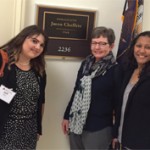Personal stories are the most effective way to communicate an issue to Congress. No one can better illustrate the complex nature of healthcare policy decisions and how they affect medical care than those involved daily in the medical profession.
Patient stories place a personal face on the hardships of insurance denials, reductions in Medicare and Medicaid physician reimbursements, and the lack of research funding, and can make your message to elected officials even more powerful. Partnering with your patients in your advocacy efforts is very important. When you work together, the impression you make will be even greater.
Apply to Be an Advocate
Advocates for Arthritis is March 15–16. The ACR covers the travel costs of ACR, ARHP, and patient participants. Apply today at www.rheumatology.org/advocacy. For more information, contact the ACR government affairs department at [email protected] or (404) 633-3777. information.
How can you involve your patients in the ACR’s advocacy efforts?
- Encourage them to attend the ACR’s 2010 Advocates for Arthritis conference in Washington, D.C., March 15–16: Advocates for Arthritis engages ACR members and patient advocates in political advocacy and increases awareness of rheumatology issues on Capitol Hill. Participants meet with members of Congress and staff to discuss current legislative issues that affect the rheumatology community as a whole. This is an opportunity for members as well as patients to establish valuable relationships with both legislators and their staff. Visit www.rheumatology.org/advocacy for applications.
- Encourage them to sign up to receive calls-to-action: The ACR sends out calls-to-action when Congress must be encouraged to act on an important issue in rheumatology. These provide instructions on communicating with members of Congress via e-mail, phone, or fax. Patients can sign up to receive alerts at www.rheumatology.org/public under the Advocacy section.
- Encourage them to contact Congress: Elected officials rely on constituent input to be effective legislators, and ongoing communication is the only way they will know how their constituents feel about particular issues. Encourage your patients to call, write, or meet with their members of Congress to educate them about the diseases and conditions affecting the patients’ quality of life. Patients can visit the ACR’s legislative action center at www.capwiz.com/acr to find contact information for members of Congress.
Getting involved in advocacy is a great way to influence the legislative process. Remind your patients that their voice is needed and their actions will make a difference to rheumatology.



